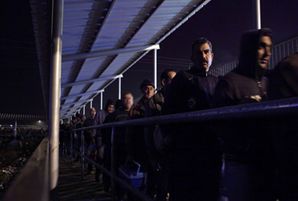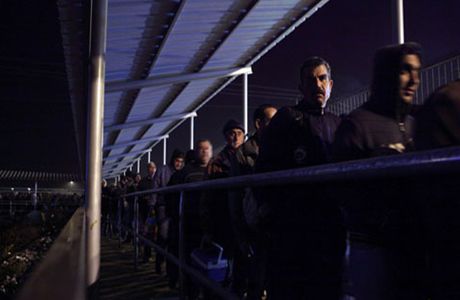
International Workers’ Solidarity Day, marked on May Day, commemorates the historic struggle of the working class. More than a century after the first May Day, Palestinian workers must still strive for the very right to earn a living without risking their lives, for the opportunity to support their families and for those self-same basic workers’ rights of minimum wage and a limit to the number of hours in a workday. Under occupation, Palestinians workers are unable to realize these basic labor rights.
In the nearly 46 years of military occupation and capitalist neo-colonial economic rule, Israeli authorities have not promoted the development of a stable and independent Palestinian economy. Consequently, many Palestinians try to obtain permits to work in Israel, yet most are denied this chance due to quotas and a complex bureaucracy. The procedure for obtaining a work permit has a fundamental catch: Israel requires applicants to secure an employer within Israel before applying for a permit. Yet, it is extremely difficult to do so without actually entering Israel – which is illegal without a permit. Palestinians who do manage to overcome this obstacle must then meet further criteria that are arbitrary and oftentimes vague. Permits are issued based on age limits that vary according to the skills, and many young men are not even allowed to apply for a permit. As a result, in order to support their families, many Palestinians have no choice but to work in Israel without a permit, despite the attendant risks. According to B’Tselem, in 2011, approximately 30,000 Palestinians with work permits were employed in Israel. Many others worked in Israel without permits. Various estimates of this number ranged from several thousand to 30,000 such workers.
Israeli authorities are well aware of the problematic situation, yet they do not offer a comprehensive solution. Instead, they merely deal with random cases of workers entering Israel illegally. Over the years B’Tselem has documented scare tactics and punishment in individual cases, even as thousands of other Palestinians, lacking other employment opportunities, continued to enter Israel without permits. In the course of both random arrests and operations designed to apprehend illegal workers, security forces are sometimes violent and have been known to fire their guns during the course of these operations. In addition, according to current, March 2013, figures provided by the Israel Prison Service, 1,420 Palestinians are in being held in Israeli prisons for illegal entry into the country.
These measures are deceptive, portraying Israel as intent on combating illegal entry of workers from the West Bank. In practice, Israel allows workers to continue entering the country illegally, a step harmful primarily to the workers. Although they do manage to eke out a living, their rights are not protected and they are in too weak of a position to insist upon them. Workers entering Israel illegally do so by hazardous routes, flee from security forces in the middle of the night and risk violence, imprisonment and even death. Faced with such obstacles, many workers choose to return home only weekends, spending the week in Israel, separated from their families and living in substandard conditions.
As the occupying power, Israel is responsible for the well-being, dignity and livelihood of West Bank residents. Yet Israel acts in contravention of international law, exploiting natural resources in the West Bank for its own needs and for the needs of the settlers, while ignoring those of the Palestinians. A case in point: Israel prevents Palestinians from developing modern and potentially more profitable agriculture by denying them access to most of the Jordan Valley and most of its water supplies. At the same time, it allocates land and a great deal of water to settlements so they can develop this type of agriculture. Israel must enable the development of a Palestinian economy in the West Bank to provide dignified work opportunities for the local population. Until that development materializes, Israel must issue permits to Palestinians wishing to work in Israel and must ensure workers’ rights. As long as Palestinian workers are not guaranteed such protection, there will be no end to the phenomenon of Palestinians who enter Israel by hazardous routes, work without proper regulation and assured rights, all so they can support their families



